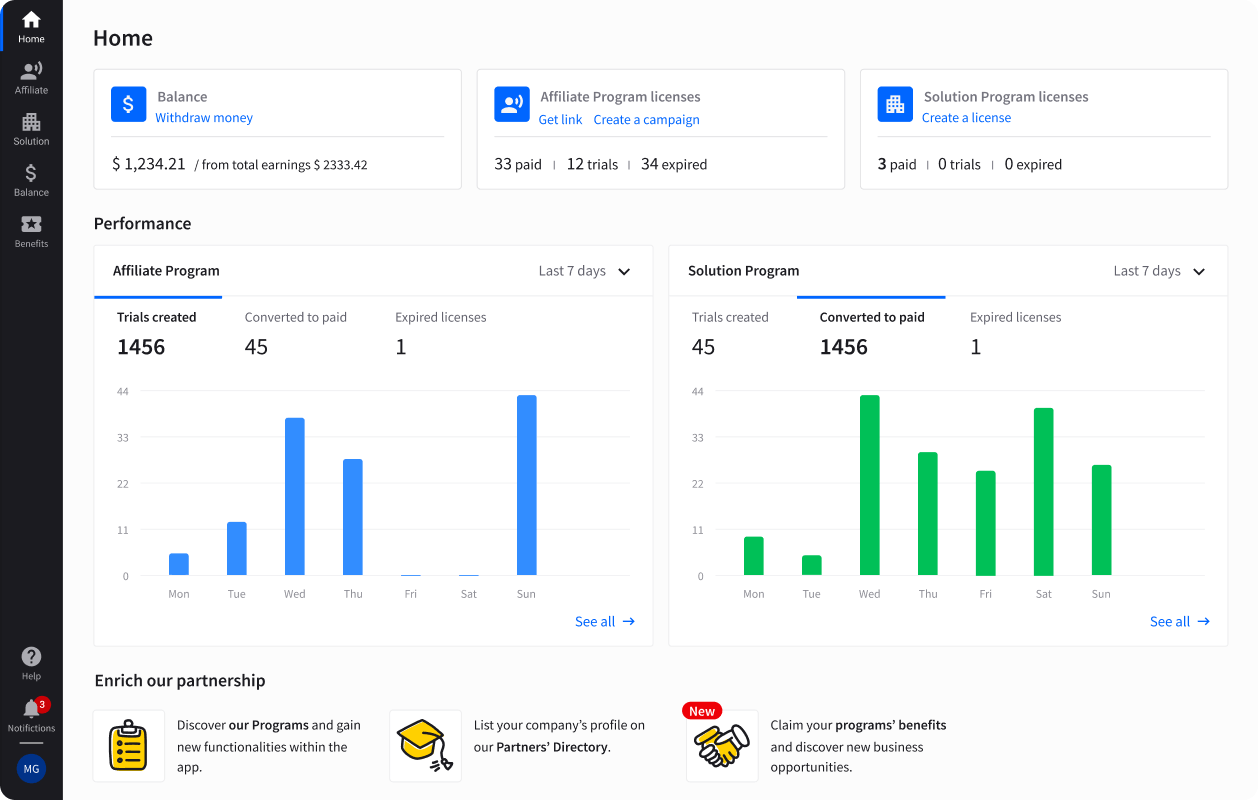Showing top 0 results 0 results found
Showing top 0 results 0 results found

How can you, as an SEO agency, offer search engine optimization services to others while not even ranking well yourself? It’s like offering legal services without passing the bar.
More importantly, how do you go about landing your first SEO client? Is it even possible?
The short answer is — yes.
The longer answer is — yes, but it will take time. It always does. The successful agencies you see have been operating for years, building their customer base brick by brick.
As a founder of an SEO agency myself, I’ll share:
- how we landed our first few customers,
- how long it took us,
- what we did,
- and what mistakes we should have avoided.
With dedication, time, hard work, and a tiny grain of luck, there’s no reason why you can’t do the same (or even better).

Growing Solvid from the ground up
First and foremost, there’s no miracle pill (or a secret strategy, if you will). Some agencies are luckier than others, and some are a bit more talented than others, but that’s as far as the “secret strategy” goes. The rest is work.
You have to get one thing through your head: it will take months and years to get to a decent level in this business.
You have to be prepared to learn — all the time. The more you learn, the more you’ll realize how little you know about SEO.
My SEO agency, Solvid, started as a one-man shop nearly ten years ago. But we are still learning.
My first client was a tennis club that I used to work at. The contract was tiny — only a few hundred pounds a month, but it paid some of the bills.
So, the first lesson is to utilize your existing contacts.
Unless your agency is your first job, most of us have some personal connections that you may use for your business. Maybe your friend’s dad is a contractor? Perhaps your sister works at a startup that may potentially need SEO? Maybe an old classmate runs their own small business?
These are all potential customers. They may not be huge, but it’s still something. And even though you should value your personal relationships over business opportunities, it almost never hurts to ask.
When you’ve exhausted all of your personal connections, it’s time to make a name for yourself with these essential steps:
- Select your niche: Although it may sound counterintuitive, limiting your services to a specific niche will likely bring you much more revenue. By trying to cover all industries, you’re blurring your specialism. It’s always best to focus on one niche and become an expert in that industry. Once you grow, you can start adding more industries.
- Build a simple yet attractive website: This is how businesses tend to reach out to other businesses. It doesn’t have to be a complex, multi-layer website. A simple, elegant website that explains what you do will suffice. If you’re not so technical, you can use a website builder. Hostinger offers a really good one that will allow you to get your website live in minutes.
- Get on agency directories: There are several agency-specific directories on which you should register. Some of the best ones include DAN, Clutch, and Designrush. These are directories specifically designed for marketing agencies and customers looking to find said marketing agencies.
- Get your hands dirty: You have to get ready to do some free work. Since you won’t have much of a portfolio at the start, you’ll have to build it before you can get a well-paying customer. This could be offering free SEO audits, website reviews, speed optimization, backlink profile reviews, etc.
👉 Read How to Start a Marketing Agency? A Step-By-Step Guide
Navigating challenges as a new SEO agency
It will be challenging to build an organic conversion funnel from the start, where you would get businesses to find your agency organically.
For us, it took nearly 10 years to get Solvid on the first page of Google for the term “SEO agency” in the UK.
But it was inevitable, considering the countless hours and effort we put into producing the right content, building backlinks, optimizing the pages, referrals, etc.
This was the first challenge.
The second challenge is scaling.
Scaling a business is never easy — let alone an agency where customers expect greater flexibility and adaptability.
You don’t want to go on a radical hiring spree (unless you have a steady influx of new customers), yet you don’t want to burn out and do all the work yourself.
There’s a fine balance between making sure your business is still profitable and not sacrificing your physical and mental health. We all have 24 hours in a day. Thinking that I could handle all of it myself was one of the biggest challenges I had to overcome.
Don’t dwell. You will lose customers.
Customers come and go. It doesn’t mean you’ve done something wrong — it’s just how the industry works. It doesn’t mean you shouldn’t focus on customer retention, though. You should. Even in SEO, customer referrals are some of the best clients you can get.
Don’t try to compete with the biggest players in the field and be the best at everything.
When starting out, it could be tempting to aim for the stars and compete with some of the biggest players in the industry. Don’t. You won’t have the capacity to do so. They have more resources and staffing, so your efforts could go to waste if they deem you a threat.
Instead, focus on one (or several) things, but don’t try to do everything all at once.
Tips for new SEO agencies looking to grow their client base
It can be difficult to secure your first SEO clients, especially when you are a startup agency that has yet to build up its reputation in the field.
Driving your first B2B leads as an SEO agency requires you to take a few extra initial steps that will later provide a foundational base for growth.
These steps include auditing your brand’s current SEO, listing your company in agency directories, building brand visibility by guest blogging and building links, and creating desirable SEO packages and products that draw client attention.
Get on top agencies lists and agency directories
This one is one of the easiest things you should do right after starting your SEO agency.
As I touched on earlier, one of the best ways to build your brand's initial visibility is to get it featured in some of the top agency lists your clients are likely to engage with.
These lists and directories can be location-based or niche-based, but they are important assets when marketing your business to new clients.
If your name appears on a top agency list, this instantly tells the client that you’re a reputable brand that can be trusted for their SEO needs.
Make your profile stand out
If you’re listing your SEO agency on an industry-specific directory, every company likely offers a similar service to you.
So, how do you stand out? The key here is to make your profile pop. Grab your client’s attention and tell them what you’re really good at.
List your services, talk about past client successes, and don’t forget to add relevant links, photos, and stats.
If you already have a portfolio, make sure you add it in. Here’s an example from our DAN page:

Choose the right directories
The key to seeing success from agency directory features is quality over quantity.
You could be listed in more than 20 local directories but still attract no client leads, or you could be listed in one niche-specific agency directory and be inundated with orders.
Pick a directory that matches your agency’s skills and is well-renowned within the industry. Popular directories include Clutch, DAN, Google Partners (if you’re offering PPC services), and Designrush.
Update your directory profile regularly
If you keep your listing fresh, you’ll appeal to clients as a brand that is ahead of the SEO curve and on-trend with its services.
Add in your most recent successes and any new services you’re now offering. Better still, I suggest that you add some of your best reviews from any other project or campaign you’ve worked on.
This tells a client your brand is alive and kicking, ready to take on a new project.
A/B test different descriptions and see which one works best.
Choose keywords smartly
If you’re a new SEO agency on the block, ensure that you’re ranking for less competitive keywords (AKA “low-hanging fruits”).
In the past, this has allowed us to increase our visibility in targeted Google searches and market our agency to the perfect niche.
The key here is to think about the keywords and phrases that potential clients may use when searching for your brand.
For example, for us, these terms would be “guest blogging service,” “SEO agency,” and “Link building service.”
However, these types of terms are rather general and often harder to rank for, as numerous competitors fight to score highly for these keywords in the SERPs, too.

Instead, get specific with your keyword targeting. Add a location or a specific service to your phrase that only a handful of agencies offer. This could be an industry-specific service or even a niche within an industry. For example, “SEO for personal injury lawyers.” It may still be hard to rank for, but not as difficult as “SEO for lawyers.”
Avoid bold outreach campaigns
While I understand how important it is to reach out to your demographic, approaching B2B leads with bold and cold outreach emails could be counterintuitive.
Not only do cold outreach campaigns have low deliverability rates, but the average email open rate has now fallen to 21% over all industries.
Worse still, cold outreach takes time. If you aim to personalize each pitch to potential B2B clients, you could waste hours on a campaign that simply falls flat.
Bold claims such as “We’re the best SEO agency in town” or “We promise to get you at the top of the SERPs” won’t get you far in a cold outreach campaign. Clients don’t like to be pestered or pushed into paying for SEO services.
If you want to embark on an email campaign, remove those bold claims and just pitch your skillset. Demonstrate what you can do, show clients your results, and provide links to your portfolio. If you’re the right match, your leads will come to you.
Again, as I mentioned above, be prepared to get your hands dirty and do some work for free.
Build brand visibility by guest blogging
Guest blogging powers a large majority of our successes here at Solvid. Whether for a client’s SEO or ours, guest blogging is a brilliant way to build high-quality backlinks and establish yourself as a thought leader in your industry.
If you can get links to your agency in large-scale publications and content that your target B2B leads engage with, you increase your chances of signing your first clients.
The key here is to write about topics in which you are experts. Let your potential clients see how much you know about your trade. Try to come up with as many original blog post ideas as possible. If you can get these thought-leadership articles on trusted websites, you’ll gain more credibility in your industry and improve your brand’s reputation within its niche.
Establishing authority and credibility within your niche is essential for an SEO startup. If you don’t have client testimonials to rely on, you must persuade your first leads to hop on board.
👉 Check 35 Best Reseller Programs You Can Join Today
Publish pillar content on your own blog
When it comes to writing content, don’t forget to nurture your agency blog.
Did you know that pillar pages are magnets for organic site traffic and backlink building in comparison to standard blog posts?
A pillar page is a blog article that talks about a broad topic. In this case, that topic is likely SEO.
When covering such a broad topic, your article will have numerous subsections that also touch the surface of multiple umbrella topics.
Leverage this opportunity to create more specific content directly related to your initial top-level blog post. These umbrella articles can then be linked to your pillar page.
Pillar content helps us build topical authority. If you talk about plenty of subtopics related to one broad pillar subject matter, you tell Google that you’re an expert in this field.
In response, Google ranks you higher in searches relating to your pillar topic keywords, which tells clients you’re an expert, too.
This is why we publish lots of different articles on SEO topics such as backlinking, content optimization, and best SEO practices.
By creating articles on subjects that intertwine, we can build internal links organically and create a circuit of thought leadership for Google to crawl and clients to sink their teeth into.

For example, this broad topic piece on backlinking strategies touches on preventing SEO penalties. We then used this article to link to a more detailed piece on SEO penalty detectors and their importance.
The more content you create on a subject, the more you reinforce your topical authority.
Closing advice for new SEO agencies
As you might have grasped by now, there’s no magical strategy to land your first customer.
In fact, it’s probably the hardest bit you’ll have to deal with.
That said, the best advice I can give you is:
- Focus on a specific niche — it’ll be easier to rank for.
- Get on agency directories and make sure your profiles are up to scratch.
- Be prepared to proactively offer work for free.
- Utilize your personal connections.
If you take all of these into account, you should be able to land your first client relatively quickly.



